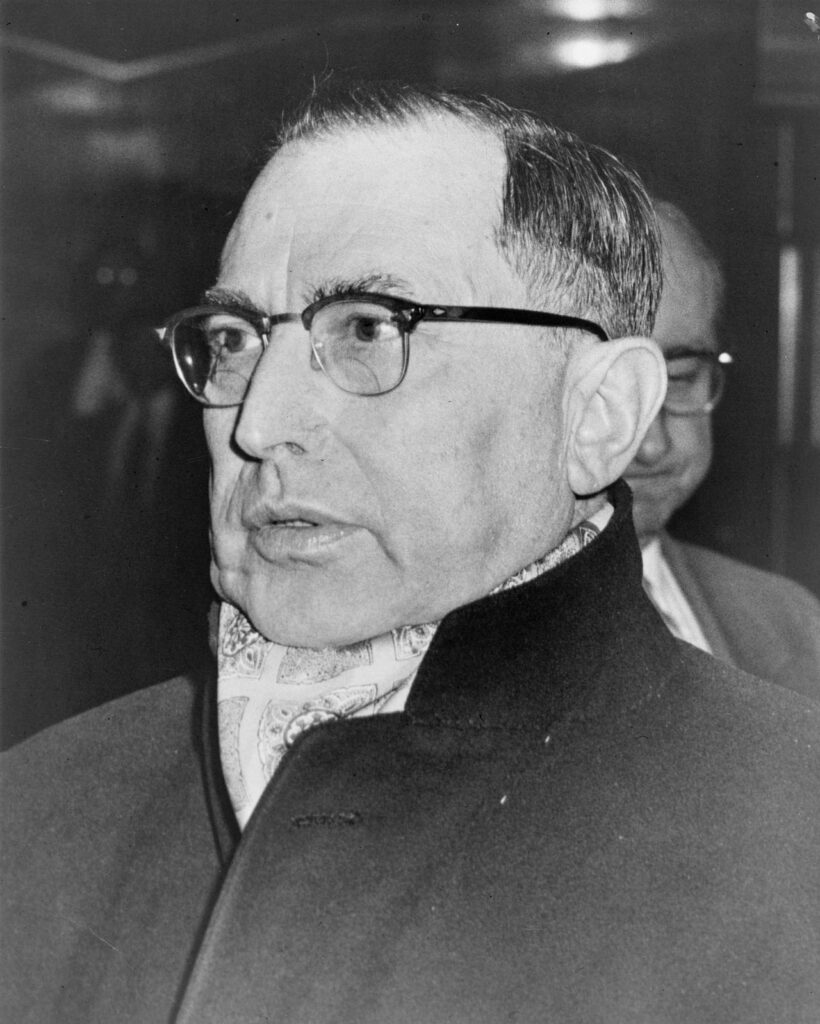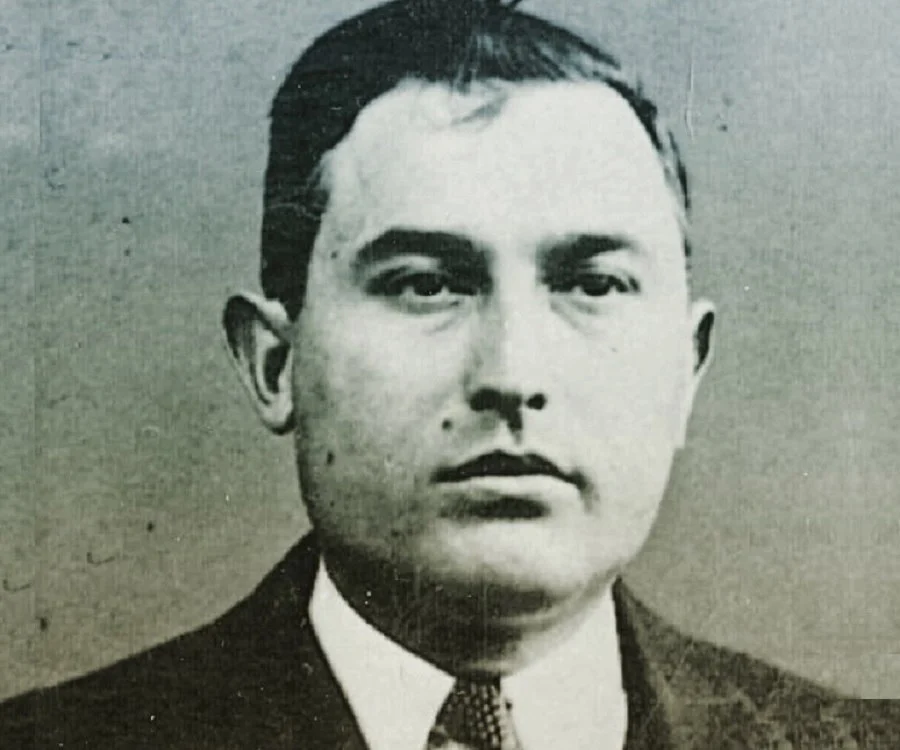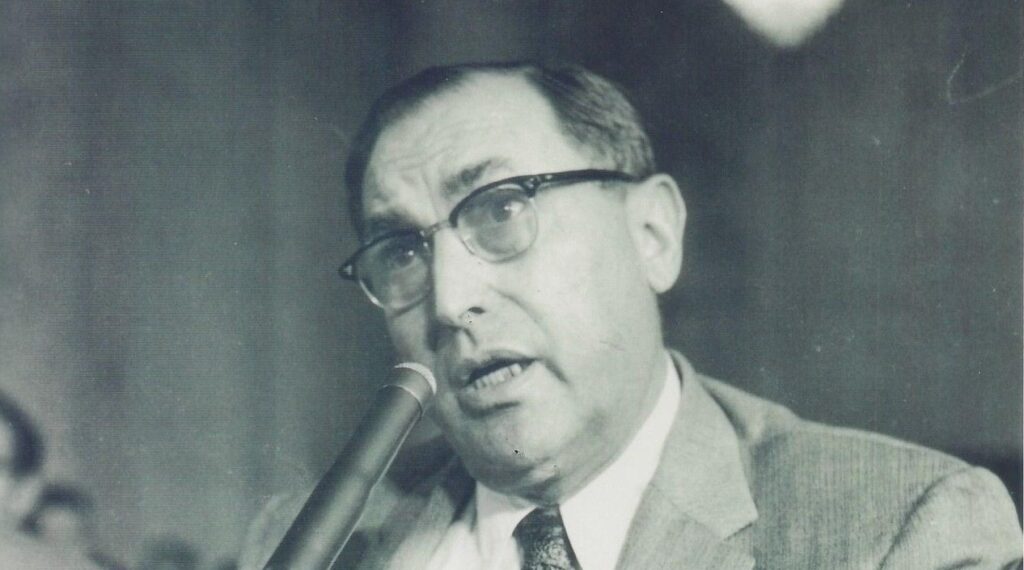Joe Profaci was a man of many talents. A business genius, a successful entrepreneur, a generous philanthropist, and above all — one of the most influential figures in organized crime in the United States during the early 20th century.
Joe Profaci left a lasting legacy that will continue to inspire future generations. From his humble beginnings in Sicily to his rise to success in America, the life of Joe Profaci was full of remarkable achievements.
This is the story of a man who turned fiction into a reality, leaving an important mark on the history of organized crime in America.

Early life and business exploits
Joe Profaci wasn’t always known as Joe Profacci. His parents — Antonio and Rosalia Mangiamale, christened him Giuseppe Profaci when he was born in Sicily in 1897. Although we know next to nothing about Profaci’s childhood in Sicily, historians believe that he was from a lower-middle-class household.
Not unlike other mobsters in history, Profaci associated with the criminal element at a young age.
As a child, he was a perpetrator of many minor crimes. In his teenage years, he moved up from petty crimes and became involved with the Sicilian mafia. Eventually, in 1920, he was incarcerated on charges of theft and battery.
Coming to America
In 1921, after completing a short one-year stint in prison, he decided, like many other Italians at the time, to migrate to the United States, a land of wealth and opportunities, in search of greener pastures.
Profaci’s final destination in the states was Chicago. He immediately opened a modest grocery store with the cash he had saved back in Sicily. The shop was open for a couple of years but was mostly unsuccessful.
Come 1925, Profaci had had enough. He decisively closed down the grocery store, ready to search for new and hopefully more profitable business prospects. His search led him to New York, where he eventually started another enterprise, an olive oil import/export business in Long Island.
Many believe that it was at this point he made solid first contact with the mafia, a step that was essential to running his import/export operations successfully. Profaci was able to leverage his latent understanding of the criminal world to his advantage. He began to grow his business with the help of his mafia connections.
In a short couple of years, Profaci had grown to become the largest olive oil exporter in the city. His appellation — the olive oil king — commemorated this feat.
Criminal career and rise to prominence
Joe Profaci was nothing if not ambitious. Despite becoming his city’s largest olive oil dealer, his ambitions were insatiable. At the pinnacle of his success with olive oil, he began to look for new business prospects, legal or otherwise.
Now that he’d made enough connections to grasp the inner workings of the New York mafia, Profaci decided to start his own gang in 1927. His relationship with mafia boss Vincent Mangano was also influential in the many factors that cumulated to this decision.
Over the following six months, Profaci’s influence grew significantly, permeating various circles in the city. The other mafia bosses, having little choice due to Profaci’s increasing renown, began to take him seriously, recognizing his faction as an up-and-coming power.

On December 5, 1928, Profaci was invited to attend the infamous mafia conference that would be taking place at the ‘Statler Hotel’ in Cleveland. Several of the most prominent mafia bosses of the period, including Al Capone, would be present at the conference.
In a series of unforeseen events, the meeting ended up being a bust. Local law enforcement had gotten an anonymous tip about the meeting and raided the venue. As a result, Joe and many others ended up behind bars.
They were arraigned in connection with bootlegging. By then, he had already built up a sizable operation in New York, specializing primarily in extortion and bootlegging, so the charges stuck.
While he was soon released on bail, he was not unhappy with the invitation to the conference because it signified he was finally being acknowledged as one of the leading mafia leaders at the time.
By 1931, Joe had become a household name in New York’s criminal underworld. He had become the proud owner of multiple businesses conducting illegal activities, from bootlegging to prostitution, narcotics, and loan sharking.
The Commission
In the aftermath of the Castellammarese War, Profaci’s criminal faction emerged as one of the new “Five Families of New York.” The dynamic power reshuffle came after Charles “Lucky” Luciano took over from Maranzano in a bloody coup following the latter’s victory in the Castellammarese War.
Profaci also earned a place for himself in Luciano’s new leadership brainchild — the commission. The commission was a ruling council comprised of several crime families, including those from other American cities, overseeing mob activity around the country.
Profaci’s legal enterprises
In the mafia world, Joe was a unique individual. He stood out from the typical culture of ruling via ruthlessness and thriving off of infamy.
His criminal operations were closely tied to his legal businesses. His legitimate business ventures prevented him from being detained for tax evasion, which was the local prosecutors’ go-to method for exposing and prosecuting organized crime groups in the city at the time.
As his criminal empire grew, Profaci never stopped running his olive oil business, which continued to be his principal legal revenue source.

He managed twenty other legal enterprises, employing hundreds of New Yorkers at the height of the great depression when unemployment was rampant. This earned him the love of many New Yorkers.
Profaci’s unique approach towards running his operations — criminal and otherwise — allowed him to stave off law enforcement, allowing him to rule without perpetual legal troubles, unlike other mafia leaders at the time.
Atypically, Profaci also wasn’t one to develop a hostile relationship with competitors. On the contrary, he went out of his way to establish good ties with most of his competitors. He was a good friend of Joseph Bonanno, the Bonanno Family head.
Profaci strengthened familial ties with the Bonannos by marrying his niece into the family. He did the same thing with Detroit city’s Vito Tocco, only this time, it was his daughter he married off to Tocco’s son.
Troubles in paradise
For the most part, Profaci’s earlier career was devoid of legal issues, but the 1950s proved difficult for the mafia leader. He ran into legal issues with the IRS in the early 1950s over a 1.5 million dollar tax evasion case.
The US Department of Justice subsequently requested that Joe’s citizenship be revoked in court. But by 1960, all of his accusations had been withdrawn after a decade-long legal battle.
At the Joseph Barbara estate in Apalachin, New York, a nationwide mob summit was held in 1957, and Profaci was in attendance. Unfortunately, New York State Troopers encircled the farm and conducted a raid while the meeting was in progress. Like how it happened back in the 1930s, Profaci, along with at least 60 other mobsters, were detained on that day.
Profaci and 21 other defendants were found guilty of conspiracy on January 13, 1960, and were given a five-year prison term. The verdicts were, however, overturned by a United States Court of Appeals on November 28, 1960.
Despite avoiding serious jail sentences throughout the decade-long legal debacle, Profaci’s troubles were far from over.
First Colombo War
In contrast to Profaci’s generosity to the community and his relatives, he was close-fisted within his organization.
His subordinates started to complain. One factor in their animosity was Profaci’s demand that each family member pay him a $25 levy each month — an old Sicilian tradition. The funds, roughly $50,000 per month, were intended to help the families of organized crime figures serving time in prison. The majority of this cash, however, remained with Profaci.
Dissent continued to grow within his organization. Joseph Gallo, a soldier based in Red Hook, Brooklyn, was foremost among his disgruntled subordinates. Gallo and his team pulled up something so audacious in February 1961 that no one could’ve possibly seen it coming.
Joe Gallo and his brothers abducted four of Profaci’s senior lieutenants on February 27, 1961. Joe’s brother Frank Profaci, pit boss Magliocco, enforcer John Scimone, and capo Salvatore Musacchia were the victims of the Gallos’ unprecedented move. Crazy enough, Profaci himself was a target of this kidnapping. He barely escaped capture and fled to California.
For the hostages’ release, the Gallos wanted a promotion and better treatment in the organization. Before discussions, Gallo intended to execute one hostage to show that they meant business, but his brother Larry intervened and stopped him. Finally, after several weeks of negotiations, Profaci and the Gallos reached a compromise. Profaci promised to meet the Gallo’s demands, and the hostages were released without bloodshed.
Profaci unsurprisingly had no intention of holding up his end of the bargain. He declared war on the Gallo brothers after he received his lieutenants. The war between the Gallo brothers and Profaci became known as the first Colombo war.
The war raged on through the streets of New York until law enforcement intervened.
Mob standoff
In 1962, Carlo Gambino and Tommy Lucchese, the head of the Gambino and Lucchese crime family, respectively, attempted to persuade Profaci to retire to put an end to the gang war. The pressure from law enforcement and the media made life challenging for the other four families.
However, Profaci, with a firm conviction that the two mob bosses were conspiring to take over his family, strongly disagreed. His staunch ally Joseph Bonanno also took a stand with him.
Ultimately, Gambino and Lucchese had to back down to prevent an all-out war between the families. The Gallo-Profaci war continued its course.
Joe Profaci’s legacy
Joe Profaci passed in South Side Hospital in Bay Shore, New York, on June 6, 1962, before the war reached its conclusion.
Despite his controversial life, Profaci’s legacy lives on today, as he is remembered as one of the most influential figures in the history of organized crime. His influence and leadership helped shape the landscape of the Mafia in the United States and worldwide.

